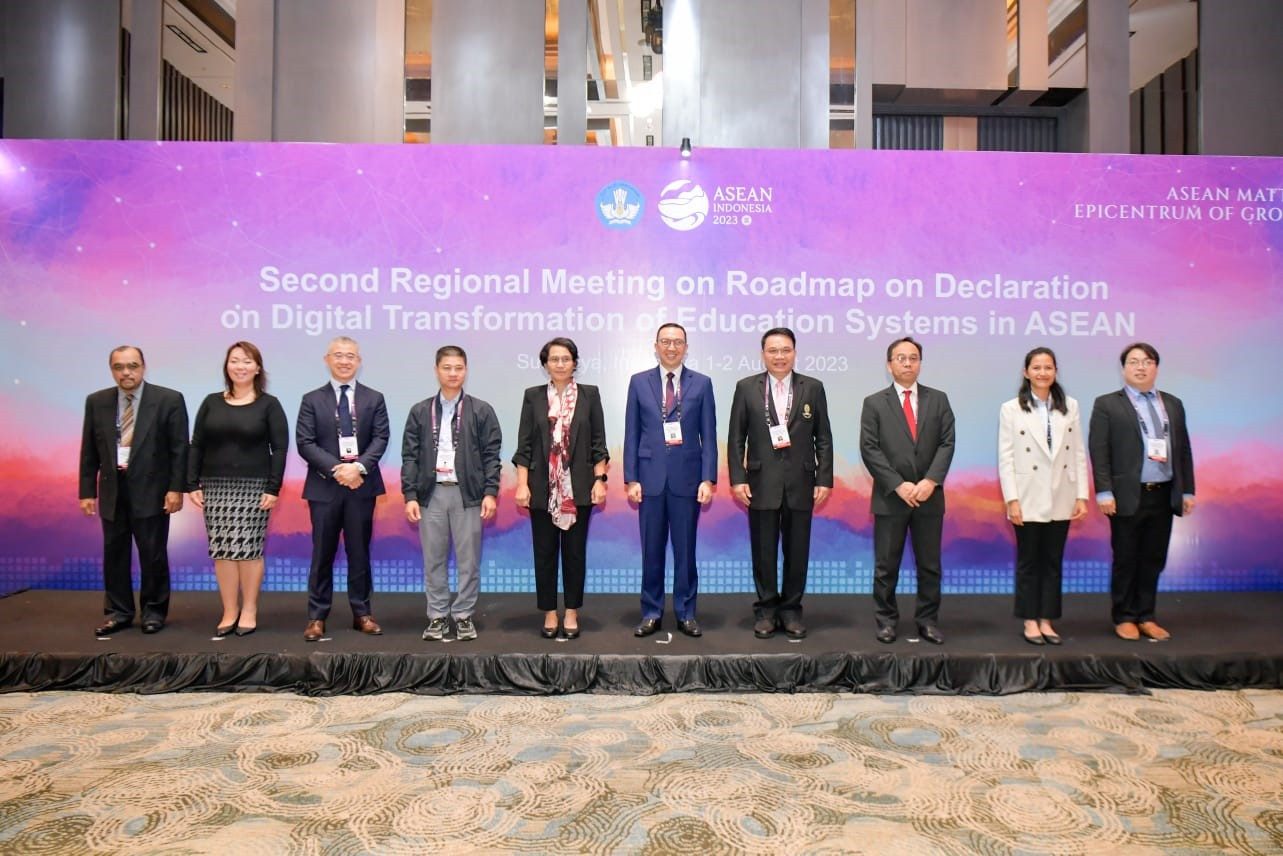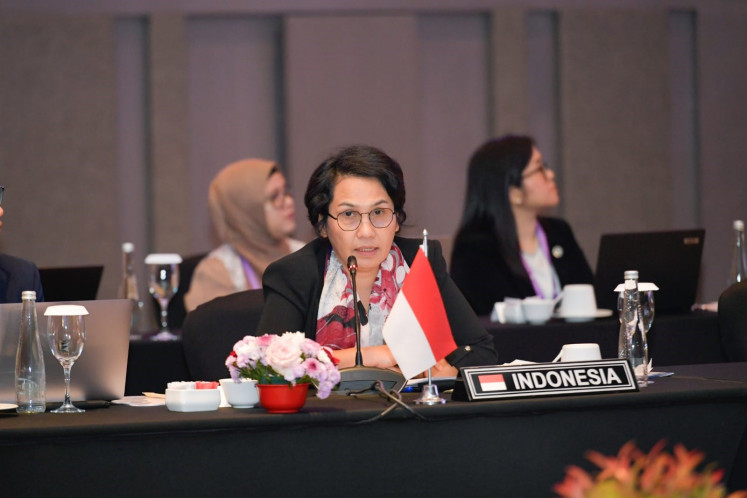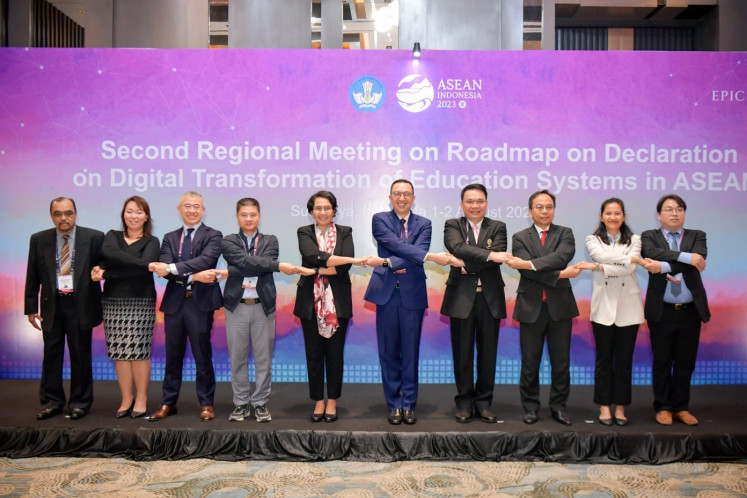Popular Reads
Top Results
Can't find what you're looking for?
View all search resultsPopular Reads
Top Results
Can't find what you're looking for?
View all search resultsMerdeka Belajar’s four priorities hoped to inspire fellow ASEAN nations
For the past four years, The Merdeka Belajar program has been the main reference for the Indonesian government in enhancing the quality of the nation’s education system.
Change text size
Gift Premium Articles
to Anyone
F
or the past four years, The Merdeka Belajar program has been the main reference for the Indonesian government in enhancing the quality of the nation’s education system. The challenges faced during the pandemic, which have significantly impacted global education systems, have driven the Indonesian government to accelerate its efforts to build improved human resources. Because of this development, the Education, Culture, Research and Technology Ministry is reaffirming its commitment to creating an educational ecosystem that is more relevant to the advancements of the times through supportive policies that cover four priority aspects.
"The pandemic has emphasized the need to strengthen collaboration and renew commitments in restructuring and rebuilding the education system," said Suharti, the ministry’s secretary-general, during the Second Regional Meeting on the Road Map on Declaration of Digital Transformation of Education Systems in ASEAN, held in Surabaya on Wednesday.
Suharti explained that Indonesia was continuing to promote the transformation of the state education system through the Merdeka Belajar program, with a primary focus on addressing the learning crisis.
"Since 2019, Indonesia has entered a new paradigm where technology plays a significant role as a driver of educational transformation," Suharti said.
Furthermore, Suharti emphasized that the Merdeka Belajar movement aimed to promote an educational system that nurtured lifelong learners who were competent and reflected the values of Pancasila.
Additionally, the Merdeka Belajar movement provides a joyful learning experience that empowers students to explore their capabilities, while simultaneously training teachers to be more effective in collaboration with school principals, in order to develop the best curriculum that suits the school's characteristics and students' needs.
Suharti explained that the movement promoted transformational policies that supported four priority aspects. These included commitment to basic learning, support for teaching skills, targeting specific groups and leveraging technology to enhance and accelerate progress.
"Among these four aspects, we begin by establishing a national assessment that serves as a manifestation of the first priority. With a comprehensive assessment design and computer-based tests, the National Assessment is designed to capture students' abilities more effectively," she added.
Through the National Assessment, the ministry encourages learning that focuses on the mastery of knowledge rather than just basic examinations. The metrics utilized for the assessment include cognitive abilities, inputs and learning processes, such as the quality of teaching, school leadership, teachers' perceptions, risks of violence, bullying and intolerance.
"Alongside assessment reforms, we have also changed the curriculum to focus more on depth rather than the breadth of knowledge. Therefore, fewer topics are covered, but there is more meaningful engagement in the classroom," Suharti explained..
The second priority is to support teaching skills by transforming pre-service teacher education from theory-oriented to practice-oriented. During their education, teachers also receive practical training and real teaching experiences. It is also worth noting that the ministry is supporting teachers in forming learning communities that can ensure peer support that can foster the emergence of various creative learning ideas.
Furthermore, the third priority involves a series of interventions that support the needs of schools, teachers, and students. These interventions include providing additional learning guidance by sending students with an interest in teaching to the Merdeka Belajar Kampus Merdeka program.
"This policy offers mutually beneficial solutions for students and schools in need of educators. On the other hand, students receive full academic credit for their involvement," Suharti added.
Regarding grant policies, the education ministry provides more funds for schools in remote areas to improve logistics and the procurement of learning equipment.
The fourth priority in the "Merdeka Belajar" movement is the utilization of technology to enhance and accelerate learning progress. As a first step, the ministry ensures beneficial and sustainable digital transformation in education by gathering, integrating and utilizing collected data. Subsequently, local stakeholders such as schools and technical implementation units (UPT) collect and validate the data before using it as a basis to create and develop new digital platforms.
Some platforms that have been launched by the ministry to support improved learning quality are Merdeka Mengajar, Rapor Pendidikan, Belajar.id and the Kampus Merdeka platform.
Meanwhile, three platforms related to school resource management are Aplikasi Rencana Kegiatan dan Anggaran Sekolah (ARKAS) , Sistem Informasi Pengadaan di Sekolah (SIPLah) and TanyaBOS.
"The digital transformation through the Merdeka Belajar movement can strengthen the education ecosystem in Indonesia and inspire our fellow ASEAN member countries," she stated.
In terms of achievements in technology innovation and the acceleration of digitalization of education in Indonesia, the education ministry has provided considerable ICT assistance from 2020 to 2022. This assistance includes the provision of funds and physical support to 70,579 formal schools, along with the distribution of 1,038,953 ICT devices.
Four digital platforms are currently being used: Platform Merdeka Mengajar (PMM), Platform Kampus Merdeka, Platform Sumber Daya Sekolah and Platform Profil Rapor Pendidikan dan Manajemen Data Serta Infrastruktur. As of 2022, there were 10,242,509 users of these digital platforms.
Additionally, various achievements related to these platforms have been recorded, such as the number of schools and educators implementing the Kurikulum Merdeka (Freedom Curriculum), accessing the PMM and the number of users of the ARKAS, SIPLah and TanyaBOS applications.
Lastly, the implementation of Kurikulum Merdeka has been widely embraced by schools, indicating a nationwide preference for a more flexible curriculum. Through the Festival Kurikulum Merdeka organized by the education ministry, interesting stories about the implementation of Kurikulum Merdeka in various educational institutions across Indonesia have been shared.












